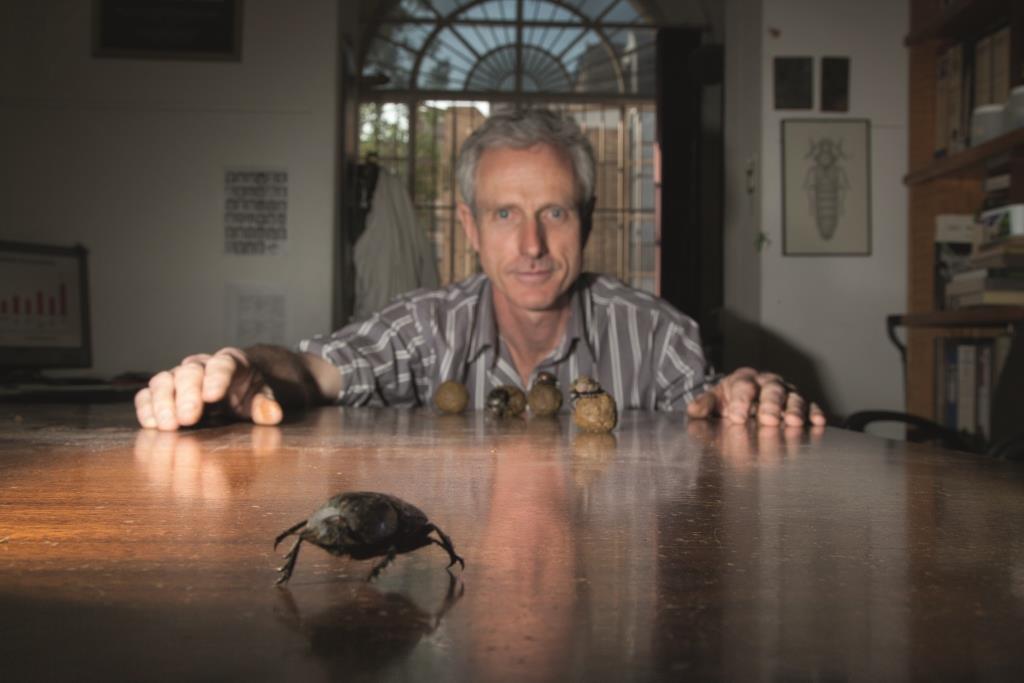It is not your everyday job. Marcus Byrne is a zoologist who discovered that dung beetles navigate by the stars and use balls of dung to cool their heels. His next assignment could be researching whether beetles cool down by spitting on their legs.
A broad grin spreads across Byrne’s face as he explains how he funds his research.
“You as taxpayers pay for me to behave like a small child and satisfy my curiosity.”
Byrne is a professor at the University of Witwatersrand in Johannesburg. He was born in Coventry, in Britain, and began working with insects when he moved to South Africa 30 years ago. In September, he won an Ig Nobel prize for his work with dung beetles. An Ig Nobel honors projects with no cash but lots of cache.
The scientist and his colleagues dressed the beetles in hats to prove that they use the stars to navigate. They also placed boots on the insects’ feet to show how they use balls of dung to cool themselves.
Loading...
Many may think that spending years working with animal faeces is repulsive, but Byrne revels in it.
“Dung is the beetle’s food source and nesting site. It is a valuable commodity. They therefore need to get away from their competitors at the dung pile as quickly as possible.”
To do this they look to the stars and the moon to make sure they are moving in a straight line. The experiment proved this. When the beetles had caps on, they could merely wander in circles.
“Here we have an animal with zero brainpower. How does it fulfil complex behaviours with minimal computing power? Eventually there may be a use for it in computers,” he says of his research.
The boots were a different experiment. It proved that the beetles climbed up on the balls of dung to find refuge from the heat on the ground.
“That is dead cool because evolution allows this animal to take something that is already useful for food for another job to increase the likelihood of their survival.”
While doing this research, Byrne discovered that the beetles spit on their front legs. When asked if he will add spit to dung for his next experiment, he replies: “Yeah. Terrible job isn’t it?”
The research was born when the question arose whether beetles dance. It fed what Byrne calls his selfish curiosity.
It’s not always enjoyable though. His work requires money that the university does not always have.
Byrne’s work on dung beetles was done on a shoestring. It was paid for by using insects to get rid of agricultural pests. He also gets money from publishing papers, but not a lot.
“We use all the money we raise on blue sky experiments. It’s not terrible. It’s great to do something we love and it doesn’t cost a lot.”
The next big project? Byrne tells of tiny bees that his colleague is studying. The information from these experiments on the eyes of the bees is being used by a car manufacturer to create a camera that is able to see light in pitch darkness without using an infrared laser.
“We can learn massive amounts of things from nature because nature is running on a minimum, which is useful for computer hardware.”
An Ig Nobel comes with prestige—any business?
“No,” he says with a laugh.
“I would be surprised if it had. The prize just raises your profile. Scientists trade in knowledge and trade in knowledge for free.”
Byrne even had to pay for his own plane ticket and accommodation to attend the award ceremony at Harvard University, in the United States.
Nevertheless, he is proud that his research has attracted worldwide interest and has nudged people’s curiosity.
“That’s the important thing about human society. You don’t have to sell everything because if you sold everything there would be very little poetry, very little music and a lot of art wouldn’t come out. It’s part of the human condition to be creative and be curious and that is what I trade in,” he says.
“I’m really grateful to you guys to pay for me to do what I love.”
Despite the success of Byrne’s research, he has one regret. Nature, one of the world’s most prestigious science journals, didn’t publish his paper.
“The interest that this has generated has been monstrous. This paper inspired people from all walks of life. It grabs people’s imagination. It is a shame that Nature rejected it. I suppose it’s like getting into FORBES as opposed to the ‘Rosebank Gazette’ (a community newspaper in Johannesburg).”
Byrne received what he refers to as a tacky trophy along with a 10 trillion Zimbabwe dollar bill, a relic of the country’s collapsed currency and a testament to human folly.
At first, the humor associated with the Ig Nobels irritated Byrne. But he warmed up.
“The guy who conceptualized the awards has created a monster that could create a huge amount of money if he sold advertising, but he focuses on promoting science and having a good time while doing it. It is not treated like a creed or gospel but rather says ‘hey, we’re having a good time here’.”
The attention that Byrne has drawn hasn’t sunk in yet. He, however, remains humble and is willing to spread the word to whomever is willing to listen. The strangest request he has received so far is being asked to talk to a nearby cuckoo bird club.
“It will probably be to six people and a dog,” he chuckles.
The Ig Nobel awards are designed to honor work that first makes you laugh and then makes you think. Byrne does the same.
Loading...
